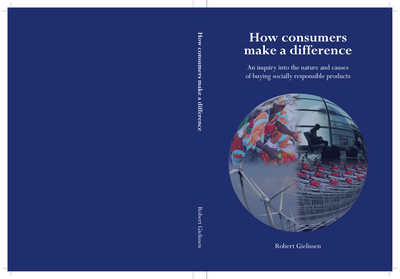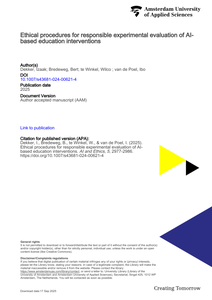This paper describes a study into consumers' reasons for buying socially responsible (SR) products, such as Fair Trade products and organic meat. As opposed to other studies, we use a qualitative approach based on 25 in-depth interviews and include several different products in the research. This leads to several new results, such as: (1) buying SR products is perceived as an imperfect moral duty; (2) low quality of SR products is a dissatisfier, but high quality not a satisfier; (3) the attitude towards SR products is related to the reputation of charitable funds; (4) the demand for SR products is negatively related to the frequency of purchasing SR products; (5) reflection on SR products raises the demand for SR products; (6) consumers that have witnessed the social problems that SR products aim to alleviate purchase more SR products. Finally, we find that the demand for different SR products is correlated: if a consumer buys one SR product, it is more likely that (s)he purchases other SR products as well.
DOCUMENT

While the concept of Responsible Innovation is increasingly common among researchers and policy makers, it is still unknown what it means in a business context. This study aims to identify which aspects of Responsible Innovation are conceptually similar and dissimilar from social- and sustainable innovation. Our conceptual analysis is based on literature reviews of responsible-, social-, and sustainable innovation. The insights obtained are used for conceptualising Responsible Innovation in a business context. The main conclusion is that Responsible Innovation differs from social- and sustainable innovation as it: (1) also considers possible detrimental implications of innovation, (2) includes a mechanism for responding to uncertainties associated with innovation and (3) achieves a democratic governance of the innovation. However, achieving the latter will not be realistic in a business context. The results of this study are relevant for researchers, managers and policy makers who are interested in responsible innovation in the business context.
DOCUMENT

DOCUMENT

Today, consumers expect companies to be socially responsible. However, the literature is undecided about the effects of communicating one's corporate social responsibility activities to consumers. This raises the question of how sustainability-driven companies can best advertise their products to stimulate ethical consumption: using self-benefit frames, where the main beneficiary is the consumer, or using other-benefit frames, where the main beneficiary is a third party. Using three experiments, this study examines the effect of other-benefit (vs. self-benefit) advertising frames on consumers' impulse purchases from sustainability-driven companies. Increasing impulse purchases can help such companies to strengthen their competitive positions. Additionally, it is studied to what extent two types of justification (moral versus deservingness) explain the proposed effect of advertising frames. The results show that only other-benefit frames affect impulse buying behavior, both directly, as mediated by moral justification. This study's insights may help sustainability-driven companies to decide on their advertising strategies by providing evidence that other-benefit-framed advertisements are more effective in enhancing impulse purchases than self-benefit-framed advertisements.
DOCUMENT

Many have suggested that AI-based interventions could enhance learning by personalization, improving teacher effectiveness, or by optimizing educational processes. However, they could also have unintended or unexpected side-effects, such as undermining learning by enabling procrastination, or reducing social interaction by individualizing learning processes. Responsible scientific experiments are required to map both the potential benefits and the side-effects. Current procedures used to screen experiments by research ethics committees do not take the specific risks and dilemmas that AI poses into account. Previous studies identified sixteen conditions that can be used to judge whether trials with experimental technology are responsible. These conditions, however, were not yet translated into practical procedures, nor do they distinguish between the different types of AI applications and risk categories. This paper explores how those conditions could be further specified into procedures that could help facilitate and organize responsible experiments with AI, while differentiating for the different types of AI applications based on their level of automation. The four procedures that we propose are (1) A process of gradual testing (2) Risk- and side-effect detection (3) Explainability and severity, and (4) Democratic oversight. These procedures can be used by researchers and ethics committees to enable responsible experiment with AI interventions in educational settings. Implementation and compliance will require collaboration between researchers, industry, policy makers, and educational institutions.
DOCUMENT

Artificial Intelligence systems are more and more being introduced into first response; however, this introduction needs to be done responsibly. While generic claims on what this entails already exist, more details are required to understand the exact nature of responsible application of AI within the first response domain. The context in which AI systems are applied largely determines the ethical, legal, and societal impact and how to deal with this impact responsibly. For that reason, we empirically investigate relevant human values that are affected by the introduction of a specific AI-based Decision Aid (AIDA), a decision support system under development for Fire Services in the Netherlands. We held 10 expert group sessions and discussed the impact of AIDA on different stakeholders. This paper presents the design and implementation of the study and, as we are still in process of analyzing the sessions in detail, summarizes preliminary insights and steps forward.
MULTIFILE

Over the past few years, there has been an explosion of data science as a profession and an academic field. The increasing impact and societal relevance of data science is accompanied by important questions that reflect this development: how can data science become more responsible and accountable while also responding to key challenges such as bias, fairness, and transparency in a rigorous and systematic manner? This Patterns special collection has brought together research and perspective from academia, the public and the private sector, showcasing original research articles and perspectives pertaining to responsible and accountable data science.
MULTIFILE

Despite several decades of Sport for All policies, opportunities for sports participation are still unequally divided, with certain socially disadvantaged groups having less access to sports. To reduce this gap, structural efforts are needed. A question that arises is what role nonprofit sports clubs can fulfill in this matter. In this study, first, it is explored how nonprofit sports clubs perceive their role and responsibility towards socially disadvantaged groups and how they act on it. Second, it is investigated which factors predict the presence or absence of efforts from nonprofit sports clubs for lowering barriers. For this second question, we focus on people living in poverty. Data are based on a survey among 580 nonprofit sports clubs throughout Flanders (Belgium). The findings indicate that the human resources capacity of the club is not the main barrier. It is argued that local sports authorities and sports federations have an important part to play in supporting and encouraging sports clubs in terms of social inclusionary policies, for example by instilling awareness.
LINK